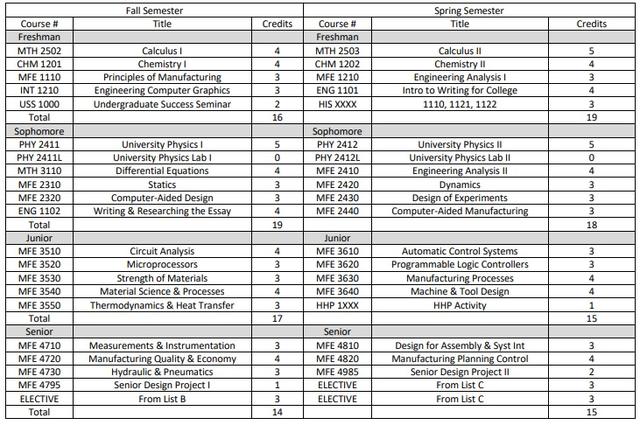
Manufacturing Engineering
The overall Manufacturing Engineering curriculum consists of strong components of mathematics, basic sciences, engineering sciences, humanities, and social sciences, together with the engineering major requirements which can be grouped into the following topic areas:
Materials and Manufacturing Processes — the structure and property relationships of materials and its change with materials processing.
Process, Assembly, and Product Engineering — the design of products and the equipment, tooling and environment necessary for their manufacture supported by rapid prototyping and 3-D layered manufacturing.
Manufacturing Competitiveness — the creation of competitive advantage through manufacturing planning, strategy, and control. Topics such as productivity, quality, reliability, economic and cost analysis, human resources, product safety and liability, social concerns, international issues, environmental impact, and product life cycle are included in this area.
Manufacturing Systems Design — the analysis, synthesis and control of manufacturing operations emphasizing modern technologies and tooling and statistical and calculus-based methods
Simulation and Information Technology — Simulation, modeling, control, architecture, and information systems supported by experimental design for factory optimality control are included in this area.
Laboratory Experience — Measuring manufacturing process variables in a manufacturing laboratory and making technical inferences about the process.
DEGREE REQUIREMENTS A total of 133 semester hours are required for the BS degree in manufacturing engineering:
GENERAL EDUCATION REQUIREMENTS (Min 39-40 hours): Twenty-seven of a total fifty (50) credits apply also to the manufacturing engineering (MFE) program requirements; see University General Education Requirements.
MANUFACTURING ENGINEERING PROGRAM REQUIREMENTS:
The majority of the MFE courses emphasize design, the process of devising a system, component, or process to meet some desired need. The design course work provides experience in open-ended problem solving by combining decision 186 making and creative thought with basic and engineering sciences. The design experience is incorporated across a variety of subject areas and increases in amount and complexity. In addition, the MFE Program is addressing the desired outcomes defined by the Society for Manufacturing Engineers (SME). It had put in place the mechanisms to ensure that by the time of graduation, the graduating seniors do possess:
- Proficiency in materials and manufacturing processes: understanding the behavior and properties of materials as they are altered and influenced by processing in manufacturing.
- Proficiency in process, assembly, and product engineering: understanding the design of products and the equipment, tooling and environment necessary for their manufacture.
- Proficiency in manufacturing competitiveness: understanding the creation of competitive advantage through manufacturing planning, strategy, and control.
- Proficiency in manufacturing systems design: understanding the analysis, synthesis and control of manufacturing operations using statistical and calculus-based methods, simulation, and information technology.
- Proficiency in laboratory practices: graduates must be able to measure manufacturing process variables in a manufacturing laboratory and make technical inferences about the process.
BACHELOR OF SCIENCE IN MANUFACTURING ENGINEERING — Marauder Lifestyle Courses: USS 1000 and 1 semester credit from Physical Activity (List A); Marauder Foundation Core Courses: ENG 1100 or ENG 1101, MTH 2502, and HIS 1110, HIS 1121 or HIS 1122; Marauder Foundation Bridge Courses: ENG 1102, 3 hours from Humanities (List B); 6 hours in two disciplines from Social and Behavioral Sciences (List C); CHM 1201, CHM 1202, PHY 2411, PHY 2412, MTH 2503, and MTH 3110.
All manufacturing engineering majors must take the following major requirements: INT 1210, MFE 1110, MFE 1210, MFE 2310, MFE 2320, MFE 2410, MFE 2420, MFE 2430, MFE 2440, MFE 3510, MFE 3520, MFE 3530, MFE 3540, MFE 3550, MFE 3610, MFE 3620, MFE 3630, MFE 3640, MFE 4710, MFE 4720, MFE 4730, MFE 4795, MFE 4810, MFE 4820, MFE 4895. A grade of “C” or better in these courses is required to earn a major degree in Manufacturing Engineering.
SUGGESTED CURRICULUM FOR THE DEGREE, BACHELOR OF SCIENCE MAJOR IN MANUFACTURING ENGINEERING The curriculum below is to be used in consultation with an academic advisor. The student must be familiar with the University requirements, the General Education Requirements, and any Special Requirements for the above degree.
Minimum hours needed to obtain a Bachelor of Science in Manufacturing Engineering – 133
